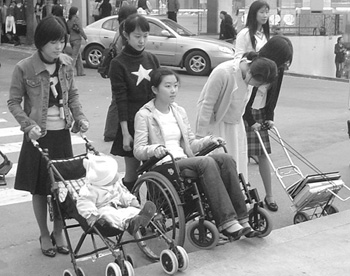
At the beginning of this year, a student using a wheelchair was denied admission to a university in Seoul, even though fewer students than the university's entrance quota applied, according to "With News." Among its entrance requirements, the university specified that some handicapped students could not apply, for the school facilities could not support them.
Could this have happened at Ewha's Marking Handicapped People's Day on April 20, the Ewha Voice looked into the life of handicapped students at Ewha to find out about the actual conditions of their life on campus.
Currently various programs are run by the Volunteer Center of Ewha Womans University in order to support the handicapped students. They lend devices such as portable computers needed for taking notes during class, and assistants are provided to help them with school life. A special registering system is also offered to handicapped students to ease their burden. Moreover, school gives priority to the handicapped students in using the dormitory and consults them with employment problems.
Despite various supporting programs, attending school is still one of the toughest things to them.
Students with auditory difficulties need assistant's help to take notes and to participate in group activities. The more the visual materials are used, the better it is for the handicapped students to understand the lecture. However, many professors use visual materials unless it is a course with many students. In addition, the conditions of audiovisual materials are poor in old buildings like Human Ecology Building and Helen Hall.
Visually handicapped students, on the other hand, usually need help with moving around campus. Since many of the school buildings are old and some paths are very steep it is difficult for them to get to the classroom safely on time. Student assistants are there to help the handicapped students for most of the time, but still brailled signs are insufficient around campus. The financial supports need to be increased as well considering the high price of special equipments like Brailled books they use when studying.
Professor Han In-young (Social Welfare) said, still there are some places within the campus that are hard for the handicapped students to approach. For example, it is difficult for handicapped students to attend school through the main entrance since there are no uphill paths to Welch-Ryang Auditorium, not to mention the Centennial Library.
Meanwhile, Teulringeurimchatgi, a self-governed group inside campus,"Seeks for a better educational environment for the handicapped students." Koh Min-ji (Special Education, 2), the leader of the group said, "Compared to the past, people are showing more interest in what we do. However I still believe there is more to be done and Ewha students' concern is what we need the most." According to the campus map published by the Teulringeurimchatgi, handicapped students can only use few of the canteens, for example. "It takes a lot of time to change the current facilities. I hope the school pays careful attention when they build ESCC," said Koh.
Other than participating in volunteer groups, students can also help handicapped students through assisting them with their school life.
Lee Seul-gi (Special Education, 3), who helped a handicapped student last semester during a course called Progress of Brain and Sense, said, "You can devote yourself to helping others at orphanages and nursing homes, but I think it is more meaningful to help your own schoolmate." But what about the handicapped student themselves? Is there anything they can do? Professor Lee So-hyun (Special Education) said, "The attitude and the will of the handicapped student is as important as the support of the school. They should actively talk about their difficulties and problems."

